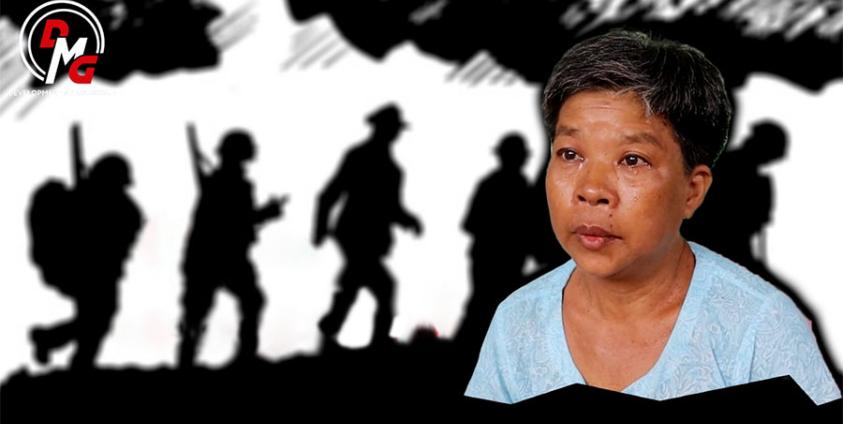Aung Thura — Outside a small house made out of tarpaulin sheets, a woman was weaving bamboo hats locally known as makkala - a traditional headgear worn by farmers and fishermen in Arakan State.
Making makkala is the primary source of livelihood for Daw Ma Kyawt Yin, a 55-year-old woman who lives in Mrauk-U Town's Shauktawsu Ward.
After her husband died in 2006, the widow was left with three sons to take care of. Misfortune struck her family again on January 9 of this year when two of her sons were killed by junta troops during fighting with the Arakkha Army (AA) in Mrauk-U.
Her eldest son Ko Tun Tun Oo, 35, and youngest son Ko Soe Naing Tun, 28, were killed by the regime. The siblings were arrested on January 9 by troops from the junta's Light Infantry Battalion No. 540 in Alae Zay Ward as they returned home after transporting Mrauk-U Town residents fleeing to the countryside on their tractor.
"People said my two sons were arrested by soldiers. I didn't know where they were taken to. Later, neighbours told me that my sons were tied up at the old Thetkya Manaung Monastery," Daw Ma Kyawt Yin recalled.
"My legs are not fit to walk for a long distance. I had to climb over fences to get there. I saw their bodies at the monastery."
Mrauk-U residents said the junta column that arrested Ko Tun Tun Oo and Ko Soe Naing Tun was ambushed by AA troops near Thetkya Manaung Monastery, and suffered casualties.
The two brothers were brutally tortured before being shot dead in the monastery compound, said Daw Ma Kyawt Yin.
"My eldest son was gagged, and his left eye was gone. His hands were tied behind his back. His pants were ripped apart. My youngest son was naked. Both had gunshot wounds."
She said her two sons lived with her and supported her, allowing her to live a life of relative ease. After their deaths, she was forced to work just to survive.
Daw Ma Kyawt Yin said she was born into a family of makkala weavers, but she did not have to work for years thanks to her two sons. She has begun to feel tired after months of weaving day in and day out, and her advanced age and poor health are also restricting her ability to work. But she cannot rest due to soaring food prices.
"Things are getting a lot harder, such that I sometimes think I will have to beg for food. But I won't. I survive by making makkala every day," said Daw Ma Kyawt Yin.
Daw Ma Kyawt Yin's second son is married and does not live with her, so she is now the household's sole breadwinner.
Daw Ma Kyawt Yin confides that it is still hard to put into words the profound pain of losing her two sons on the same day to the same ruthless regime.
"I can't tell you how I felt when both the sons I gave birth to were killed," she said.
"I have often wondered whether the junta soldiers could bear it if their children were killed by someone else. I was angry when my two sons were killed," she added.
On the same day that Daw Ma Kyawt Yin's two sons were killed, there were also some other residents who were arrested and killed by the junta column in Mrauk-U. U San Shwe Kyaw, a 52-year-old man from Alaezay Ward in Mrauk-U, was arrested by the junta contingent from Light Infantry Battalion No. 540.
Although the column that detained U San Shwe Kyaw did release him shortly thereafter, he was shot and killed by a member of the No. 31 Police Battalion near Alaezay Bridge.
Family members want justice for those who were killed after being arrested by junta soldiers and police in Mrauk-U.
"The armed forces of both sides can fight each other, but they have nothing to do with civilians," said Daw Ma Hla Tin, the younger sister of U San Shwe Kyaw. "I am not satisfied that the armed forces are killing civilians like this. I want justice. I want effective measures to be taken against the regime, which committed war crimes."
U San Shwe Kyaw lived with his sister and he was shot dead by junta soldiers while he remained at home during the battle for control of Mrauk-U.
Residents also say that the junta soldiers roaming around Mrauk-U at the time arrested and killed other civilians who were not involved in the fighting.
Ko San Win, a social activist from Mrauk-U, said that the junta soldiers' torture and inhumane actions were completely unacceptable.
"The junta soldiers tortured the people very much. The junta soldiers have no humanity," the social activist added.
The AA seized control of the ancient Arakanese city of Mrauk-U on February 7, 2024, after a two-month-long battle. But the victory - one of many since the beginning of this year for the ethnic armed group widely viewed as representing the Arakanese people's best hope for a better future - came at a dear price for Daw Ma Kyawt Yin and others.
"My sons took care of me, saying that there was only one mother in their lives. Now there is no one to take care of me," she said. "If possible, I have even reached the point where I want to die like my two sons."








